Motorsports Racing News & Blog Articles
Church of MO: 2012 Suzuki DR-Z400S Review
And speaking of Japanese motorcycles with looooong shelf lives, how about the DR-Z400S? Suzuki sold the first one in 2000 as a serious enduro machine you could ride around on the street, too. And they’ll sell you one today, complete with 36mm Mikuni carburetor, for just $7,099 – which is $1750 more than 22 years ago. That nicely tracks the price of real estate. Wait, that’s not quite accurate… Take it away, Tommy Roderick:
A dual-purpose motorcycle without equal
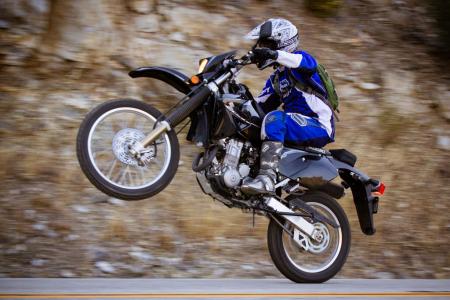 Lacking any competition from the other Japanese OEMs, the 50/50 dirt-to-street Suzuki DR-Z400S rules the mid-displacement dual-sport category. Lacking any competition from the other Japanese OEMs, the 50/50 dirt-to-street Suzuki DR-Z400S rules the mid-displacement dual-sport category.
|
The 400cc DR-Z bridges the gap between the modestly powered 250cc models and the oftentimes overweight and street-biased 650cc models. Compared against its DR-Z650SE stable-mate, the 317-pound curb weight of the 400 bests its kin by 49 pounds and produces surprisingly similar horsepower numbers. Our 400S cranked out 31.2 hp, while the 650 we tested in our 2007 Three for Five: Budget Bombers article pumped out 35.3 ponies. The big DR’s extra displacement shines through in the torque readings, churning out a significant 10.4 ft-lb more than the 400’s 23.5 ft-lb.
While the 650’s extra torque is certainly beneficial, when it comes to finessing a bike over and around various off-road obstacles, we’ll take the lesser weight of the 400 rather than the power advantage and heavier weight of the 650.
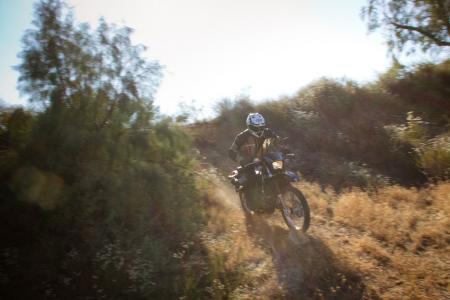 Navigating narrow singletracks in loose conditions is much easier on the DR-Z400 than its bigger-displacement rivals. Navigating narrow singletracks in loose conditions is much easier on the DR-Z400 than its bigger-displacement rivals.
|
When we tested Yamaha’s WR250R last year, the 298-pound (wet) machine output 27.7 hp and 17.0 ft-lb of torque. With the DR-Z weighing only 19 pounds more than the Yamaha but boasting 3.46 more horsepower and 6.52 ft-lbs of torque, we’re attracted to the realistic possibility of shedding some of the 400’s weight, bringing it closer to that of the 250’s rather than attempting to close the 50-pound gap between the 400 and 650.
After a day of swapping the Suzuki for the Husky TE250 (see our forthcoming shootout), it is our opinion that by reducing the DR-Z’s weight, stiffening its suspension and installing some aggressive rubber on its rims the DR-Z can be transformed into a serious off-road weapon. While shaving the DR-Z down to the TE’s 255-pound wet weight is impractical, getting it close to or below 300 lbs is within reason.
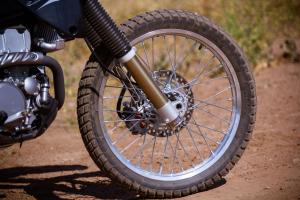 A fully adjustable fork and strong front brake can handle a greater level of off-road difficulty than the stock front tire. A more aggressive tread will do wonders for rider confidence on technical terrain.
A fully adjustable fork and strong front brake can handle a greater level of off-road difficulty than the stock front tire. A more aggressive tread will do wonders for rider confidence on technical terrain.
A fully adjustable, 49mm front fork with 11.3 inches of travel combined with a rear shock adjustable for preload and compression damping with 11.8 inches of travel are formidable suspension components. Plush stock settings smooth minor street imperfections but are easy to bottom out during aggressive off-road riding. Stiffening both front and rear components allows a rider to better explore the DR-Z’s capabilities.
Not the best we’ve tested, but stopping power from the DR-Z’s 250mm front disc brake with a dual-piston caliper and a 220mm rear disc brake with a single-piston caliper is more than adequate. The front brake delivers a strong initial bite and is easy to modulate which is crucial when off-roading with the small-knobby stock front tire.
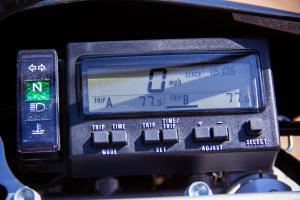 It’s blocky and unattractive, but the DR-Z’s instrument cluster provides all the functions necessary for both on- and off-road riding.
It’s blocky and unattractive, but the DR-Z’s instrument cluster provides all the functions necessary for both on- and off-road riding.
In addition to its streetable rubber, Suzuki equipped the DR-Z with road-going niceties such as a digital instrument cluster with twin-trip meters (with addition/subtraction capability), a clock, timer and stopwatch functions. There’s also passenger footpegs, a helmet lock and a thick, although narrow, seat providing relatively more comfort than true dirt bikes.
While the 398cc, DOHC, liquid-cooled Single produces usable amounts of low-end torque, Suzuki equipped the DR-Z with a five-speed gearbox that limits a rider’s choice of power delivery. While most 650cc D-P bikes also utilize five gears, we’d prefer the 400 to have a six-speed gearbox like the majority of small- and mid-displacement D-P bikes.
Southern California highways and their common 80-mph flow of traffic (when traffic is flowing) is a little much for the DR-Z. The engine is spinning quite fast to keep that pace which makes for a buzzy experience. At 65 mph and under the single-cylinder engine thumps along at a tolerable cadence. A sixth cog in the DR-Z’s transmission would go a long way in making the DR-Z a better freeway machine.
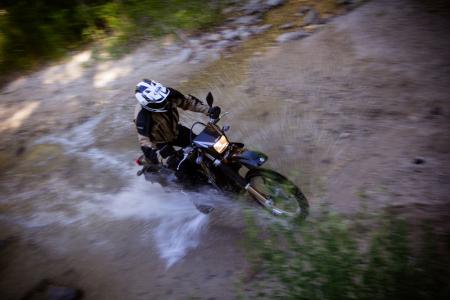 Dirt, pavement or water, the DR-Z attacks them all with aplomb. Dirt, pavement or water, the DR-Z attacks them all with aplomb.
|
A glaring oversight of DR-Z engineers is the simple omission of brush guards. Certainly not a deal breaker but when Suzuki’s own DR650SE – a less dirt worthy model than the DR-Z400S – comes with these off-road-inspired items as standard equipment, it just makes you wonder why they didn’t install them on the 400. Another un-dirtbike-like facet of the DR-Z is its metal tank. One wrong dismount (which is an accepted aspect of aggressive off-road riding) and the DR-Z’s metal tank will forever wear a dented reminder of the event.
The Suzuki DR-Z400 has no direct competition in terms of displacement and price, making its performance and $6,200 MSRP a combination that’s hard to dismiss. The DR-Z is equally competent on the street as it is in the dirt. For the person wanting an enduro that can navigate a single-track or fire road as well as perform daily commuting duties and even some short adventure-touring trips, the DR-Z is a D-P bike worthy of consideration.
Related Reading
2012 KTM XC Enduro Line Reviews
2011 Yamaha WR250R Review
2010 Husaberg FE570 Review
2009 Kawasaki KLX250S Review
2008 Lightweight Dual-Purpose Shootout
2005 Suzuki DRZ 400 SM
All Things Dual-Purpose
All Things Off-Road
The post Church of MO: 2012 Suzuki DR-Z400S Review appeared first on Motorcycle.com.
Copyright
© Motorcycle.com

